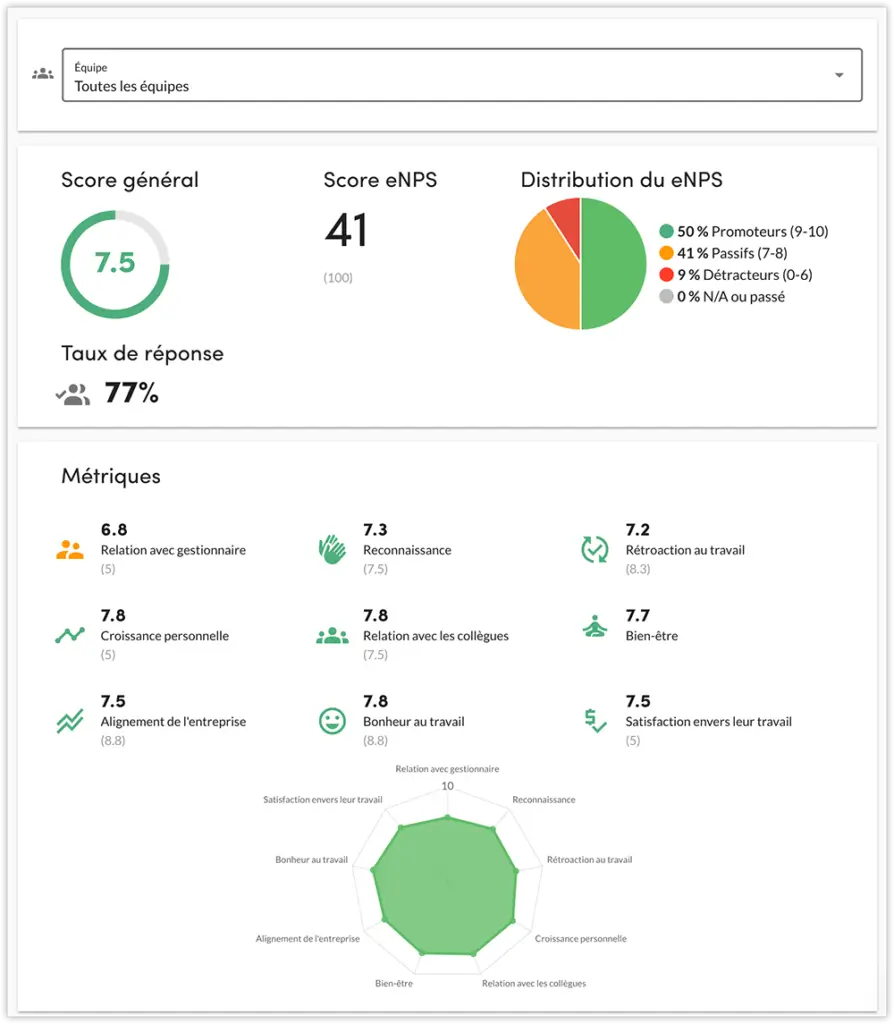Human resources professionals must redouble their efforts to recruit and retain talent within their company. This is a major issue that will continue to concern organizations of all sizes over the next year.
Faced with this uncertainty, some may consider using unusual ideas to try to distinguish themselves as an employer. However, retaining your teams through proven solutions can make a huge difference in this area.
Watch now: FREE WEBINAR How to become a top employer during this salary increase period?
Establishing a constant dialogue with your teams is a must to create a sense of belonging to your organization. To achieve this, we recommend that you set up 1-on-1 meetings with your employees and your managers. These recurring meetings will foster a climate of trust and improve communication within your company. Without further ado, find out now why these meetings are important, how often they should be planned, and 6 valuable tips to better prepare them!
What are 1-on-1 meetings with your employees and managers?
Did you know that 1-on-1 meetings with your employees and managers are a key element in building healthy relationships within your company? They provide an opportunity for your managers and collaborators to discuss ongoing projects, the achievement of established objectives, current issues and much more. These meetings also allow managers to get to know their employees better on a more personal level. To this end, they will be able to learn about their career aspirations, their interests, as well as the opportunities for professional growth.
Through these discussions, your managers will ultimately be able to engage their employees to get to know them better. In return, your teams will feel supported, which will make them want to get more involved in work.
How often should your 1-on-1 meetings take place?
It is crucial to determine an appropriate frequency for your 1-on-1 meetings with your employees. Ideally, you should regularly assess the satisfaction and challenges of your employees.
The higher the frequency of your meetings, the more visibility you will have on the various ongoing projects. However, it is important not to fall into micro-management and turn your follow-up meetings into supervisory meetings! Consequently, we suggest that you establish a certain distance between each meeting so that employees can have the opportunity to implement the advice and elements previously discussed.
Although the frequency of your 1-on-1 meetings depends on the nature of the employee’s position, we advise you to schedule them on a bi-monthly basis. This will allow you to rigorously monitor the work in progress, the employee’s well-being, and the challenges they face. This will allow you to provide the necessary support at the optimal time before the situation deteriorates.
Of course, your employees must feel that 1-on-1 meetings are relevant and productive. Listen to see if they are satisfied with the frequency determined. In this regard, we recommend that you regularly send out satisfaction surveys for employees to confirm if the current frequency is suitable for them!
Why is it important to organize such meetings?
Each organization has its own area of expertise that requires 1-on-1 meetings with your employees and specific types of meetings. A personalized approach is therefore preferable!
Nevertheless, despite their personalization, these 1-on-1 meetings all have a common goal: to maintain clear, open and transparent communication between employees and their managers. Thus, everyone can work towards a common goal.
In addition to better employee retention, here is a list of the benefits of 1-on-1 meetings with your employees:
- They help build trust between employees and their managers;
- They make employees feel that they have the necessary support when needed;
- They are the perfect opportunity to thank your employees for their good work;
- They enable you to address the achievements and successes of your employees;
- They enable you to address the challenges your employees encounter to find solutions;
- They provide an opportunity for employees to ask questions to better understand their role within the company;
- They allow you to talk about career opportunities within your company;
- All in all, these meetings help develop a sense of belonging towards your company.
6 tips for effective 1-on-1 meetings with your employees
1. Recommend to manager and employee to prepare in advance for richer discussions
To ensure the success of your 1-on-1 meetings with your employees, we aim to create a dynamic meeting. To achieve this, what better way to share your meeting agenda with your employees and managers a few days in advance so that they have the opportunity to better prepare?
Through this initiative, the 1-on-1 meetings with your employees will be seamless. Your colleague will have had time to reflect on the topic, which will allow them to better express themselves and explain some of the issues encountered at work. This enriching and constructive exchange will allow your manager to give them support adapted to their current needs. All in all, getting ready early is a great way to deepen your discussions to build trust.
2. As a manager, think about ideas of questions to ask
As a manager, it is your responsibility to ensure that the exchange with your collaborator is fruitful and rewarding. Think about the points you want to raise during your colleague exchange. For example, before your 1-on-1 meetings with your employees, ask yourself:
- Do they seem satisfied with their working conditions?
- Do they have good relations with their colleagues and with you?
- How can the team help them do their job?
- Are there any missing tools that could be beneficial to the employee?
It is recommended that the manager have good control over their meeting agenda so that the employee feels directed to the various questions to be answered. We want to avoid the employee feeling compelled to fill the discussion with what they feel the manager would like to hear. Keep this advice in mind to optimize your 1-on-1 meetings with your employees and managers!
3. Take notes to assess progress through meetings
Writing a summary of your 1-on-1 meetings is an essential tool to better coach your employees. By taking notes as you speak, you will always remember the information obtained during your discussions. In addition, by sharing this report with the appropriate employee, you can avoid misunderstandings to provide the best possible support. This will also help you improve as a manager! By comparing your summaries, you will be able to evaluate the progress of the elements discussed over the weeks to keep an eye on the evolution of your employees and thus, offer better feedback. This will help you understand what to expect in future meetings with your employees.

4. Create a climate of listening and empathy
During your 1-on-1 meetings with your employees, it is essential to remember that these exchanges should serve your employees. So your meetings need to build a relationship of openness and trust that will strengthen the sense of belonging to your organization. Transparency and vulnerability make human relationships more authentic. Work is no exception! It is normal to feel worse sometimes. In order for things to get better, you have to have a dialogue with your colleagues at work. Take the time to validate the well-being of your employees. By taking an individual interest in them, you will be able to understand certain issues in their daily lives that impact their morale at work. You will be able to better support them, but also make them feel how much they are supported and appreciated by your organization. This mark of empathy will definitely have a positive impact on their morale. In return, they will be much more motivated and happy at work!

5. Meet in a confidential location, even if teleworking
When it comes to 1-on-1 meetings with your employees, we think of rich, constructive and confidential exchanges. To the extent possible, it is therefore recommended to choose a confidential location to foster a climate conducive to confidence. After all, we want to prevent a colleague from feeling uncomfortable about entrusting themself to a manager, who is surrounded by several employees.
In the office, choose a quiet and isolated environment to plan your meeting. If necessary, we suggest you book a small conference room to ensure the confidentiality of your exchange. To make a change, why not suggest individual meetings in various forms? We are thinking about a short walk or a coffee break, all while reporting on the last few weeks. This will have a positive impact on the morale of your employees and make your meetings less formal!
During a telework meeting, choose a closed space for a little privacy. In order to get as close as possible to an in-person exchange, we strongly advise you to proceed with the meeting by video call. Non-verbal cues will help you understand the real feelings of your employees, for a more authentic exchange.
Remember: it is essential to plan your 1-on-1 meeting with your employees in a quiet and confidential setting. This will certainly allow you to get concrete feedback to get a better overview of their overall situation within your company!
6. Allow sufficient time for 1-on-1 meeting with your employees
As you may have noticed, there are several topics you need to cover in your 1-on-1 meeting with your employees. In this sense, it is important to take the necessary time to address the agenda and let your staff speak!
While your meetings serve to build trust, they can also leave a feeling of bitterness and misunderstanding if you seem to be in too much of a hurry. Your employees will not have time to express themselves or to fully understand the tasks assigned to them. They will then feel left out and may even think that you are not taking them seriously.
To ensure the well-being of your colleagues, take the time to learn about their current feelings. Depending on your availability, reserve at least 30 to 45 minutes for your 1-on-1 meeting with your employees. This will allow you to discuss in detail the personal and professional issues your teams face on a daily basis. Through these discussions, your talents will feel considered and listened to, which will have a direct impact on their commitment to work. This is a must for building authentic and lasting relationships that will increase your employee retention rate!
12 ideas for questions to ask during 1-on-1 meeting with your employees
- How have you been since we last met?
- Is everything going well with your co-workers?
- What aspect of your role do you find most motivating?
- Do you have an issue or a problem that prevents you from doing your job?
- Are you satisfied with your working conditions?
- Are you satisfied with your job performance?
- Are the tasks assigned to you realistic?
- Do you understand what is expected of you in the coming weeks?
- Are there any tasks you would like to have additional training for?
- Can I offer you additional support? How can I help rectify the situation?
- Do you have any questions or comments?
- Is there anything you want to talk to me about?
How can InputKit help you improve your 1-on-1 meeting with your employees?
Would you like to gather additional information during your 1-on-1 meeting with your employees? If so, InputKit’s employee experience solution is exactly what you need!
With our customized and automated employee satisfaction surveys, you’ll know your teams’ key metrics in the blink of an eye. Well-being at work, relationships with colleagues, relationships with managers, motivation at work, commitment to the organization: take advantage of our many question templates to save valuable writing hours. In addition, our surveys are anonymous, an essential asset to know the honest opinion of your employees!
With our weekly surveys, you can regularly ensure the well-being of your employees. Beyond 1-on-1 meetings with your employees, these surveys will allow you to take action according to their concrete needs before it is too late. This valuable information will help you improve communication between your managers and employees. In addition, with the metrics collected, you’ll know what to talk about in your meetings to ensure the continuous improvement of your teams at work.

Plan my free InputKit demo to optimize employee feedback processes
How can you improve your 1-on-1 meetings with your employees? Benefit from our expert advice to ensure the well-being of your teams at work!
Encourage your managers and employees to prepare in advance for richer discussions. To do this, tell your managers to think about the questions they want to ask and then share them with the appropriate employee before proceeding with the meeting.
Throughout your discussions, write down the subjects discussed to better follow the evolution of your employees. Allow enough time to ask all your questions and listen to the feelings of your colleagues. In order to obtain concrete and authentic feedback, ensure to schedule your meetings in a confidential place, even during telework exchanges. Finally, remember that the key to these meetings is a relationship based on listening and empathy!
Now that you are fully aware of the importance of 1-on-1 meetings with your employees and managers, do you need a complementary solution to better assess your teams at work? With InputKit, you’ll know your employees’ key metrics in just a few clicks.
Are you interested in our solution? We invite you to plan a free and personalized demo of InputKit, at the moment of your choice. Our team of experts will be happy to contribute to your employee experience!
To conclude, here is an interesting TED Talk on the importance of planning your organizational meetings well. In this capsule, David Grady describes what to consider when inviting your collaborators to a meeting. Draw on his advice to avoid unnecessary meetings and encourage concrete and constructive exchanges between colleagues!
FREE FRENCH WEBINAR
How to become a top employer during this salary increase period?



Related articles

Receive our best articles and tips by email
Be the first to know about our new articles.







